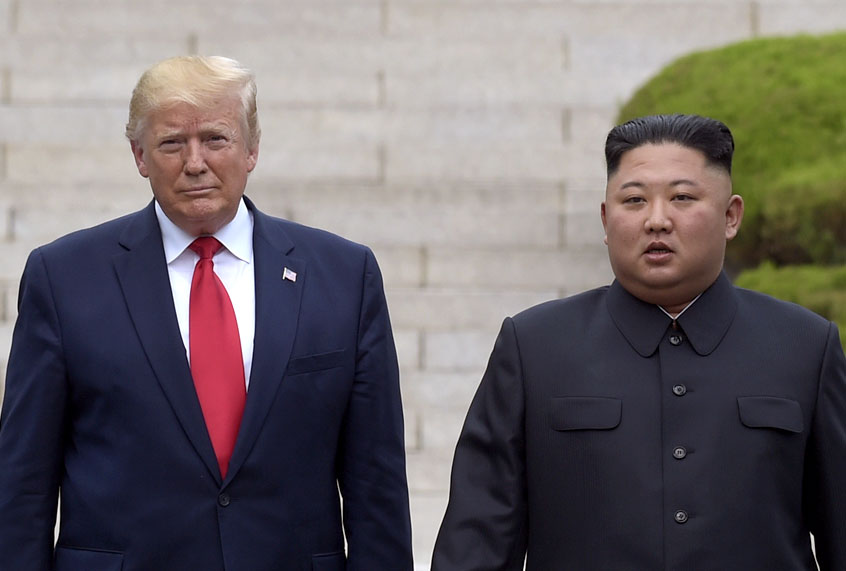A new report reveals that President Donald Trump is mulling whether to tacitly accept North Koreas a nuclear power — and, in the process, legitimize the rogue nation on the world stage.
Members of the Trump administration hope to kick off a new round of negotiations with North Korean dictator Kim Jong-un by agreeing to a nuclear freeze, a move that if implemented would tacitly accept North Korea as a nuclear power and enshrine its weapons as part of the status quo, according to the New York Times.
The proposed deal being considered would reportedly require North Korea to stop developing its nuclear arsenal but would not require it to either dismantle existing weapons or limit the Kim regime’s missile capability.
The Times also said the proposed new approach “would begin with a significant — but limited — first step.” It described the concept in detail:
American negotiators would seek to expand on Mr. Kim’s offer in Hanoi in February to give up the country’s main nuclear-fuel production site, at Yongbyon, in return for the most onerous sanctions against the country being lifted. Mr. Trump, under pressure from his secretary of state, Mike Pompeo, and his national security adviser, John R. Bolton, rejected that proposal, because so much of the North’s capability now lies outside the vast Yongbyon complex.
The plan would reportedly depend on the Kim regime agreeing to expand its definition of what counts as the Yongbyon site, accept rigorous inspections and refrain from making new nuclear materials.
Trump made history over the weekend by becoming the first sitting president to set foot on North Korean soil, an act which was followed by a private meeting with Kim. What, if anything, was agreed to during their private meeting remains unclear.
There are widespread concerns that Trump’s current approach toward North Korea has empowered and legitimized the despot while doing little, if anything, to curtail the power of his unstable regime. This point was articulated by former Secretary of Housing and Urban Development Julián Castro during a Sunday appearance on CNN.
“Well, look, I’m always for speaking to our adversaries, opening up diplomatic conversations,” the Democratic presidential candidate told host Brianna Keilar. “The problem is that this president seems bent on approaching this very erratically, very haphazardly. As you know, Brianna, he did this at the last minute. And the problem with that is that to be effective, this usually goes the other way around. There’s a lot of staff work that goes into preparing a meeting like this so that concrete terms are on the table and you can get something out of the meeting.”
He added, “They had the first summit — the Singapore summit — I guess just over a year ago, and North Korea has not abided by what it promised at that summit, which was to produce an inventory of their weapons stockpile so that there could be a baseline for further talks. So I’m not quite sure why this president is so bent on elevating the profile of a dictator like Kim Jong-un when Kim Jong-un has not lived up to his promise from the first summit.”
Former Secretary of State Madeleine Albright expressed her concerns about Trump’s North Korea policy during an interview with Salon earlier this year.
“Well let me say, every administration that I’ve read about since the end of World War II has had a very difficult relationship with North Korea,” Albright told Salon. “There’s no question about it. And then also since the Korean War — for which we do not have a peace treaty — there are issues where we have had not relationships with North Korea, and we have no embassy in North Korea. We do know that they have a nuclear capability and missiles. So those are the problems.”
She added, “I do think that many administrations — including the one that I was in, and I was the highest-level sitting official to have met with the North Koreans until the present administration — is that they are not easy to deal with, and they are threatening, so I am concerned about the following things: First of all, at the beginning of the Trump administration, there was a lot of ‘fire and fury’ talk and threats and things like that, which I thought were counterproductive. I do believe in diplomacy. But I also do believe in prepared diplomacy. I was asked whether the Singapore summit was a win-win or a ‘Kim win.’ It was a ‘Kim win,’ because the president canceled some exercises that we have with our allies — the Japanese and the South Koreans — and it’s unclear to me what the North Koreans gave or what it is that they put up to this, especially since they have not agreed to any kind of way of an inventory or international way of figuring out what they have and what denuclearization — which is what we are trying to get — what is the measurement of that? What’s going on?”


